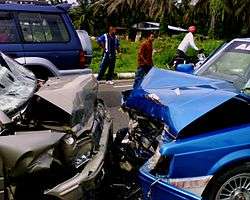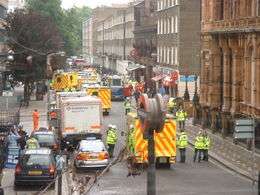British Association for Immediate Care
 | |
| Full name | British Association for Immediate Care |
|---|---|
| Founded | 1977 |
| Key people |
James Hickman, Chairman Tony Kemp, Vice-Chairman |
| Office location | England, UK |
| Country | United Kingdom |
| Website | BASICS |
The British Association for Immediate Care (BASICS) is a registered charity[1] which aims to encourage and aid the formation and extension of Immediate Care Schemes and strengthen and develop co-operation between schemes providing Immediate Care and the statutory emergency services. The organisation relies on volunteer medical professionals and Allied Health Professionals to provide immediate healthcare assistance in support of the emergency services.[2][3] It is based in Ipswich.
Purpose
BASICS is an association of health care professionals, who undertake additional training as immediate care practitioners. The members provide their services in support of the statutory or voluntary ambulance services.[4]
BASICS aims to be:[2]
- A professional body to represent members interests
- An operational body to facilitate the individual schemes
- A training body to further knowledge amongst its members
- An advisory body for its members and other stakeholders
BASICS provide a member of the JRCALC members section to aid in the development of clinical guidelines for UK paramedics and EMTs.

BASICS members are used to provide extra skills at the scene of major incidents, or for particularly difficult patients. For this, individuals may be summoned on a case by case basis by the local ambulance control centre. Further support for the work of BASICS during major incidents came following the July 7th terrorist attacks on London, when the British Medical Association started a series of training courses (over 3 years) to be organised by BASICS.[5]

They also work at private events, often alongside the voluntary ambulance services (Red Cross and St John Ambulance) or the statutory service. This means that BASICS members can be found at events such as:
- large sporting events (including Football Association matches)[6]
- major incidents
- public rallies
- road traffic collisions
- mass gathering events
- concerts
Local applications
BASICS assist the ambulance service trusts where a multi-agency response is required at a local level, or additional skills and qualification levels are required. An example of this multi-agency response would be seen at an 'industrial accident' where for example a worker has become trapped in machinery. The ambulance service would work alongside the fire service to co-ordinate the rescue.[7] BASICS can supplement the skill set available at scene with a medical doctor, who can provide skills outside the remit of paramedics, such as different methods of providing analgesia and, if necessary, surgical procedures which might be needed to extricate the patient.
Local schemes
BASICS-affiliated schemes across the UK include:[8]
- Lincolnshire Integrated Voluntary Emergency Service
- Magpas
- Suffolk Accident Rescue Service
- MedAlert
- SWIFT Medics Wiltshire
- Mercia Accident Rescue Service
- West Midlands CARE Team
Many of the UK air ambulance organisations are affiliated to BASICS.
Staffing
Doctors
BASICS started up as a small number of General Practitioners who were concerned about the immediate care that car crash victims were receiving.[9] Their goal was to bring increased clinical expertise to the scene on a voluntary basis. Now BASICS Doctors come from a wide range of specialities, including: General Practice, Surgery, Medicine, Emergency Medicine, Anaesthesia & Critical Care.
Nurses
Nurses who specialise in pre-hospital care play an important in the delivery of patient care in the prehospital arena. Some Nurses working in pre-hospital care are able to work at Advanced Nurse Practitioner level with a high degrees of clinical autonomy and decision making, some are also independent prescribers.
Paramedics
Being the primary Pre-Hospital medical care provider in the UK, Paramedics are a valued part of BASICS schemes. Many have undertaken additional training and education to become Critical Care Paramedics with an extended range of pharmacology and potentially life saving interventions to complement those of their colleagues. Some Paramedics respond autonomously under BASICS schemes, whilst others respond in Paramedic/Doctor teams.
Combat Medical Technicians
Combat Medical Technicians are also welcome members of BASICS and bring a high degree of knowledge and experience to BASICS.
References
- ↑ "British Association for Immediate Care Entry". UK Charity Commission. Retrieved 2007-06-16.
- 1 2 "Introduction to BASICS". Retrieved 2007-06-16.
- ↑ "On the Scene". BBC News. 1999-12-27. Retrieved 2007-06-16.
- ↑ "Call for NHS to fund BASICS emergency doctors". BBC News. 22 September 2012. Retrieved 25 May 2014.
- ↑ "BMA supports emergency medicine training as tribute to 7 July bomb victims". 25 May 2006. Archived from the original on 26 September 2007.
- ↑ "Refresher and skills update for crowd doctors". The Football Association. 2002-05-30. Retrieved 2007-06-16.
- ↑ "Emergency response and recovery". Cabinet Office. Retrieved 25 May 2014.
- ↑ http://www.basics.org.uk/schemes_burrow/schemes_map
- ↑ "BASICS: History". BASICS Scotland. Archived from the original on 2014-05-08. Retrieved 2014-05-07.